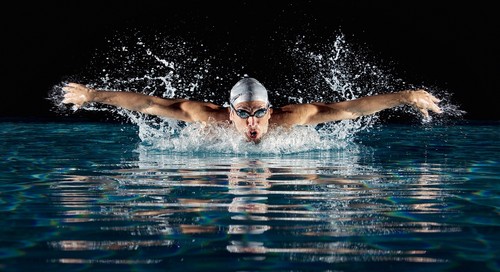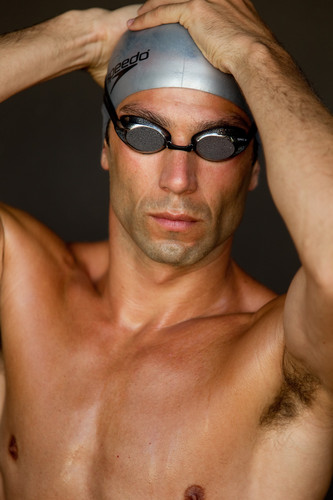Leigh-Chantelle
How long have you been vegan?
What has benefited you the most from being a vegan?
What does veganism mean to you?
Respect.
Training
What sort of training do you do?
How often do you (need to) train?
Do you offer your fitness or training services to others?
What sports do you play?
Strengths, Weaknesses & Outside Influences
What do you think is the biggest misconception about vegans and how do you address this?
Many omnivores view vegans as more committed to the wellbeing of non-humans than humans, and they find this attention misplaced. The majority of vegans, however, are not at all dismissive of human suffering, just as the majority of omnivores are not dismissive of non-human suffering. Everyone is different. So when I discuss veganism with non-vegans I try to focus on the things that they, as individuals, are most interested in. If that involves them - their diet, their health - rather than animals, pollution, water conservation and so on, then that’s what I stick to: them.
What is your biggest challenge?
Are the non-vegans in your industry supportive or not?
Are your family and friends supportive of your vegan lifestyle?
What is the most common question/comment that people ask/say when they find out that you are a vegan and how do you respond?
“So, like, you can’t eat bacon?” It’s amazing how often I hear this word “can’t” as if the choice I’ve made has somehow become an intrinsic part of me, as though it were physically impossible for me to consume flesh. I can. I simply don’t. Veganism is a choice; no different than carnism is a choice. They appear different only because carnism is so culturally engrained that we take it as “natural.” We do not stop, think, and realize that omnivores, just like vegans, make choices. All of us can eat just about anything. Some of us choose not to.
What do you eat for:
Breakfast - Generally cereal with almond milk and fruit. Sometimes oatmeal. Sometimes a toasted bagel with hummus. I’ve gotten back into juicing a few times a week, which I love. It clears my head.
Lunch - For lunch I usually have leftovers from dinner. If not I’ll have a sandwich of roasted veggie or seitan-avocado-tomato or a mushroom burger with arugula and caramelized onion. It varies.
What is your favourite source of:
Protein - I guess peanut butter. Beans. Nuts. Leafy, green vegetables. I don’t usually think about protein since it’s in practically every imaginable whole food I eat, in more than sufficient servings.
What foods give you the most energy?
Probably dates, raisins, and other dried fruits for quick energy. Fresh oranges and bananas too. Granola is another good one.
Advice
What is your top tip for:
Gaining muscle - Increasing lifting and increasing protein.
Losing weight - Increasing cardio and decreasing calories, including those from alcohol and processed sugar.
Maintaining weight - Determining your own personal intake to output balance.
Improving metabolism - Increasing high-intensity aerobic training and decreasing processed sugars and similar junk.
Toning up - A combination of cardio, consistent weights, and smart eating.
How do you promote veganism in your daily life?
By inviting others to ask questions, then encouraging them to explain and defend their choices just as soundly as they ask me to explain and defend mine. It is more effective to let someone figure out for himself that his diet is detrimental than it is to shout it at him.
VLV Articles
David Raphael (D.R.) Hildebrand is a vegan of ten years and a nationally ranked Masters Swimmer in New York. He races middle-distance freestyle and individual medleys and he coaches the Fashion Institute of Technology swim team as well as fellow Masters Swimmers at Team New York Aquatics. Away from the pool, he is an author and a model. His first novel, Walking Marina, is an exposé of the male modeling industry, and his current project is about swimming. He also contributes regularly to the vegan blog, The Discerning Brute. You can find him on Facebook and Twitter.

Why Vegan?
How and why did you decide to become a vegan?
I grew up vegetarian, though my family ate fish sporadically. Sometime during college, I began to sense that eating dairy, eggs, and anything else from animals was antithetical to my morals. From then on I gravitated more and more toward veganism, until the transition was complete.
How long have you been vegan?
Over ten years - I don’t remember specifically.
What has benefited you the most from being a vegan?
Veganism heightens my inner consciousness as well as my global consciousness. It awakens me. It requires me to think, to stay engaged, to take responsibility. It encourages me, multiple times a day, to make active choices rather than passive ones.
What does veganism mean to you?
Respect.
Training
What sort of training do you do?
Mostly middle-distance - combining aerobic and anaerobic conditioning.
How often do you (need to) train?
In general, I swim about four or five days a week, usually about 4500 yards (4.11km) over 90 minutes. Anything more than that and I lose interest - anything less and I get antsy. I lift and run as well, depending on my schedule and the season.
Do you offer your fitness or training services to others?
I coach and give private instruction, though I don’t actively seek clients.
What sports do you play?
Swimming.
Strengths, Weaknesses & Outside Influences
What do you think is the biggest misconception about vegans and how do you address this?
Many omnivores view vegans as more committed to the wellbeing of non-humans than humans, and they find this attention misplaced. The majority of vegans, however, are not at all dismissive of human suffering, just as the majority of omnivores are not dismissive of non-human suffering. Everyone is different. So when I discuss veganism with non-vegans I try to focus on the things that they, as individuals, are most interested in. If that involves them - their diet, their health - rather than animals, pollution, water conservation and so on, then that’s what I stick to: them.
What are your strengths as a vegan athlete?
Mentally, I’d say discipline, consistency and resolve. Physically, I probably recover quicker.
What is your biggest challenge?
Finding, as theologian Reinhold Niebuhr said, “the serenity to accept the things I cannot change, the courage to change the things I can, and the wisdom to know the difference.”
Are the non-vegans in your industry supportive or not?
Some are and some aren’t. I only discuss it with other athletes when they ask me what I eat. Either way, I didn’t establish my diet to win others’ support. I maintain a lifestyle that I believe is sound.
Are your family and friends supportive of your vegan lifestyle?
If they weren’t I doubt I would think of them as family and friends.
What is the most common question/comment that people ask/say when they find out that you are a vegan and how do you respond?
“So, like, you can’t eat bacon?” It’s amazing how often I hear this word “can’t” as if the choice I’ve made has somehow become an intrinsic part of me, as though it were physically impossible for me to consume flesh. I can. I simply don’t. Veganism is a choice; no different than carnism is a choice. They appear different only because carnism is so culturally engrained that we take it as “natural.” We do not stop, think, and realize that omnivores, just like vegans, make choices. All of us can eat just about anything. Some of us choose not to.
Who or what motivates you?
Honesty. I’m an addict for the truth.
Honesty. I’m an addict for the truth.

What do you eat for:
Breakfast - Generally cereal with almond milk and fruit. Sometimes oatmeal. Sometimes a toasted bagel with hummus. I’ve gotten back into juicing a few times a week, which I love. It clears my head.
Lunch - For lunch I usually have leftovers from dinner. If not I’ll have a sandwich of roasted veggie or seitan-avocado-tomato or a mushroom burger with arugula and caramelized onion. It varies.
Dinner - The gamut: whole wheat pasta with miso pesto sauce; just about any sort of stir-fry; curry dishes; burritos; pizza; salad; roasted Brussels sprouts with onion and garlic no less than once a week; anything with kale, quinoa, chickpeas, tempeh, you name it. It’s always changing.
Snacks (healthy & not-so healthy) - My number one snack is an apple and peanut butter. I sometimes make vegan shakes or cookies. If I’m at a good vegan restaurant, I might get chocolate cake. I really love dates, dried fruit, caramelized bananas, coconut rice pudding. Usually, though, it’s an apple and peanut butter.
What is your favourite source of:
Protein - I guess peanut butter. Beans. Nuts. Leafy, green vegetables. I don’t usually think about protein since it’s in practically every imaginable whole food I eat, in more than sufficient servings.
Calcium - Dark greens, nuts, flax seed, sesame seeds.
Iron - More dark greens, rice-and-bean dishes, pumpkin seeds, whole grain bread.
What foods give you the most energy?
Probably dates, raisins, and other dried fruits for quick energy. Fresh oranges and bananas too. Granola is another good one.
Do you take any supplements?
No. I don’t understand supplements. A diet in need of supplements is a diet in need of change.
No. I don’t understand supplements. A diet in need of supplements is a diet in need of change.
Advice
What is your top tip for:
Gaining muscle - Increasing lifting and increasing protein.
Losing weight - Increasing cardio and decreasing calories, including those from alcohol and processed sugar.
Maintaining weight - Determining your own personal intake to output balance.
Improving metabolism - Increasing high-intensity aerobic training and decreasing processed sugars and similar junk.
Toning up - A combination of cardio, consistent weights, and smart eating.
How do you promote veganism in your daily life?
By inviting others to ask questions, then encouraging them to explain and defend their choices just as soundly as they ask me to explain and defend mine. It is more effective to let someone figure out for himself that his diet is detrimental than it is to shout it at him.
How would you suggest people get involved with what you do?
Buy a bathing suit. Swimming is a full-body workout. It relaxes as well as stimulates the mind. It cleanses the soul. It opens the lungs. It stretches every muscle. Find a pool, a river, a lake. Go solo or in a group, and let the water move you.
Stay tuned for upcoming interviews with other Vegan Athletes, Fitness Fanatics and Exercise Enthusiasts by Subscribing via RSS.
Want to be interviewed for a future article?
Leigh-Chantelle is an International Speaker & Consultant; Author, Singer/Songwriter and Blogger.
Latest Photos
© Leigh-Chantelle Site by
DesignVoodoo.com|hosted green| mobile compatible|Google Translation
mobile compatible|Google Translation
 This work is licenced under a Creative Commons Attribution-NonCommercial-NoDerivs 3.0 Australia Licence
This work is licenced under a Creative Commons Attribution-NonCommercial-NoDerivs 3.0 Australia Licence
 This work is licenced under a Creative Commons Attribution-NonCommercial-NoDerivs 3.0 Australia Licence
This work is licenced under a Creative Commons Attribution-NonCommercial-NoDerivs 3.0 Australia Licence
